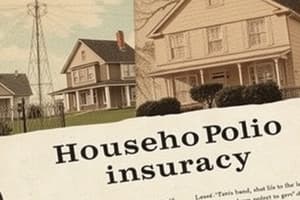Podcast
Questions and Answers
What is a peril in the context of insurance?
What is a peril in the context of insurance?
- An immediate, specific event that causes a loss (correct)
- A condition that makes a loss more likely
- An event that increases the likelihood of a loss
- A factor that can be measured or observed
Which type of insurance policy explicitly lists the perils it covers?
Which type of insurance policy explicitly lists the perils it covers?
- Special (Open) Perils
- Comprehensive Perils
- Specified (Named) Perils (correct)
- General Perils
What feature distinguishes Special (Open) Peril policies from Named Peril policies?
What feature distinguishes Special (Open) Peril policies from Named Peril policies?
- They cover all perils not explicitly excluded (correct)
- They exclude all perils unless specified
- They list all perils they cover
- They only cover natural disasters
What type of hazard stems from the dishonest character of the insured?
What type of hazard stems from the dishonest character of the insured?
Which of the following is an example of a physical hazard?
Which of the following is an example of a physical hazard?
What is a hazard in the context of insurance?
What is a hazard in the context of insurance?
How does a special (open) peril policy handle perils?
How does a special (open) peril policy handle perils?
What is considered a moral hazard?
What is considered a moral hazard?
Which peril is an example of a natural disaster?
Which peril is an example of a natural disaster?
What defines a physical hazard?
What defines a physical hazard?
Flashcards are hidden until you start studying
Study Notes
Peril (Causes of Loss)
- A peril is an immediate, specific event that causes a loss, such as fire, lightning, windstorm, hail, earthquake, and flooding.
- Perils can also be referred to as the accident itself.
Named Perils Versus Special (Open) Perils
- Insurance policies define perils protected against in one of two ways: Specified (Named) Perils and Special (Open) Perils.
- Named Perils policies individually list perils that they cover, and if a loss is caused by a peril that is not listed, it is not covered.
- Special (Open) Perils policies do not name the perils they cover but instead begin by saying they cover all direct causes of loss.
Hazards
- A hazard creates an increased possibility that a peril will actually occur.
- Examples of hazards include icy roads, driving while intoxicated, and improperly stored toxic waste.
Types of Hazards
- Physical hazards are physical or tangible conditions that make a loss more likely to occur, such as poor health, ice, and fire.
- Moral hazards make the loss more likely to occur due to the dishonest character of the insured, who may be more disposed to either engage in criminal activity or cause a loss.
- Moral hazards occur when the insured is more intentioned and conscious of participating in wrongdoing that is more likely to lead to a loss.
Studying That Suits You
Use AI to generate personalized quizzes and flashcards to suit your learning preferences.




